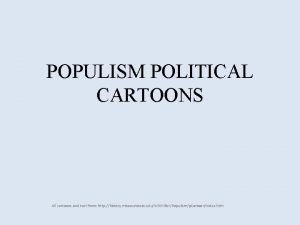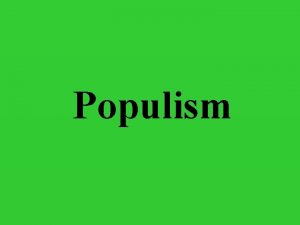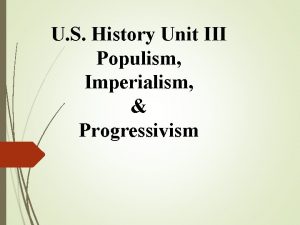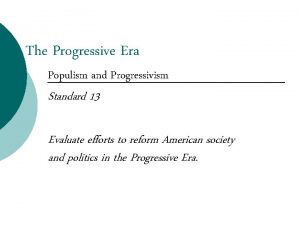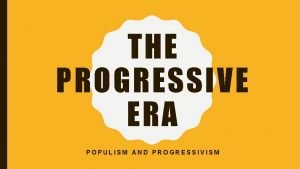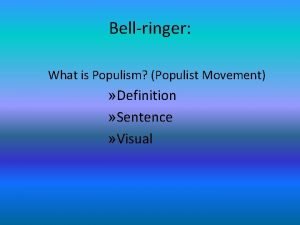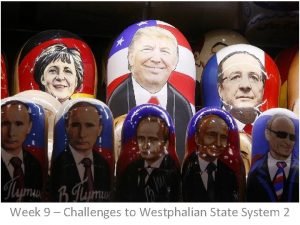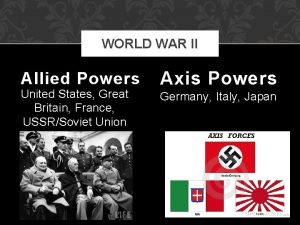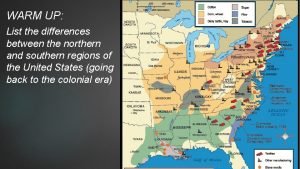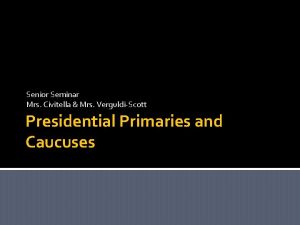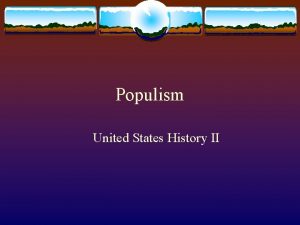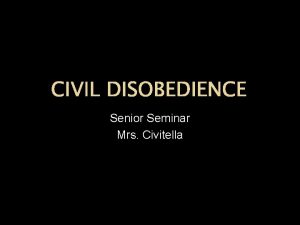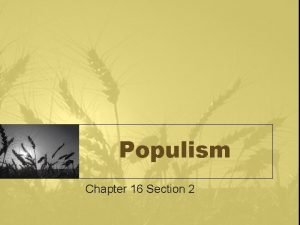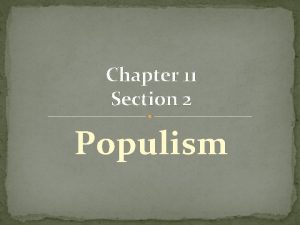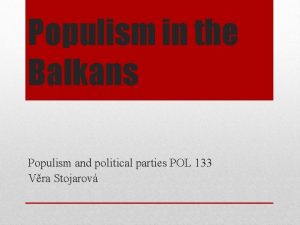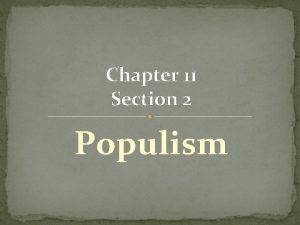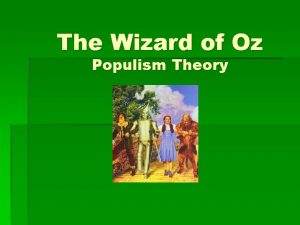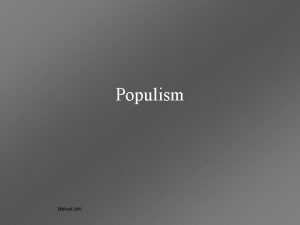Populism Mrs Civitella A P United States History

















- Slides: 17

Populism Mrs. Civitella A. P. United States History

Push-Pull Factors to Western Settlement Push factors Pull factors • Civil War had displaced thousands of farmers, former slaves (Exodusters), and other workers • Eastern farmland was increasingly costly for lower class whites and immigrants • Failed entrepreneurs • Outlaws on the run • • Pacific Railway Act 1962 Morrill Land Grant Act 1862 Homestead Act 1862 New federal and state laws enforcing property rights for farmers, miners, cattle ranchers- land parcels were measured, registered and deeded


The Money Issue - inflation • If the government increases the money supply, the value of every dollar drops • This drop in value shows up as inflation, a widespread rise in prices on all goods • People who borrow money benefit from inflation because the money they eventually pay back is worth less than the money they borrowed • Inflation also helps sellers, such as farmers, because it raises the prices of the goods they sell

The Money Issue- deflation • If the government reduces the money supply, the value of each dollar becomes greater causing deflation • Deflation causes a drop in the prices on goods • People who lend money are helped by deflation because the money they receive in payment of a loan is worth more than the money they lent out

Monetary Policy following the Civil War • After the Civil War, the nation’s money supply shrank as the government took the paper money issued during the war out of circulation • The nation experienced a period of deflation • Monetary policy became a major political issue • “tight money” supporters wanted deflation

Monetary Policy- continued • Prior to the panic of 1873 the U. S. had been on a bimetallic standard meaning that U. S. Treasury notes could be traded in for gold or silver • to stabilize the economy, congress put U. S. currency on a gold standard reducing the amount of money in circulation because the amount of money supply was limited by the amount of gold held by the government • Conservative “gold bugs” were pleased

Silverites • The move to the gold standard outraged silver mining interests and western farmers • Fearing that an end to silver as a monetary standard would depress farm prices • “Silverites” called for free silver- the unlimited coining of silver dollars to increase the money supply







The Wizard of Oz as a monetary allegory • • • • the Scarecrow - the wise, but naive western farmers the Tin Woodman - the dehumanized, Eastern factory workers the Wicked Witch of the East - the Eastern industrialists and bankers who controlled the people (the Munchkins) the Good Witch of the North - New England, a stronghold of Populists the Good Witch of the South - the South, another Populist area the Wizard - President Grover Cleveland, or Republican Presidential candidate William Mc. Kinley the Cowardly Lion - Democratic-Populist Presidential candidate William Jennings Bryan Dorothy - a young Mary Lease; or the good-natured American people Dorothy's silver shoes - represents the 'silver standard' (acc. to the Populists, "the free and unlimited coinage of silver") Toto - the 'teetotaling' Prohibitionists (or Temperance Party), an important part of the 'silverite' coalition the Yellow Brick road - the 'gold standard' - paved with gold, but leads nowhere the land of Oz - oz. is the standard abbreviation for ounce, in accordance with the other symbolism Emerald City - Washington, D. C. , with a greenish color associated with greenbacks the Poppy field - the threat of anti-imperialism


 United states history and government regents
United states history and government regents They are mrs garcia and mrs castro
They are mrs garcia and mrs castro They are mrs garcia and mrs castro
They are mrs garcia and mrs castro Mrs. darling was ___________ of mrs. s.
Mrs. darling was ___________ of mrs. s. The wizard of oz
The wizard of oz Populists party apush
Populists party apush What does glinda the good witch represent in populism
What does glinda the good witch represent in populism Here lies prosperity cartoon
Here lies prosperity cartoon Wabash v illinois
Wabash v illinois Cuban rebellion against spain
Cuban rebellion against spain Populism and progressivism
Populism and progressivism Populism and progressivism
Populism and progressivism Populist in a sentence
Populist in a sentence Stankov political economy of populism download
Stankov political economy of populism download Populism oxford dictionary
Populism oxford dictionary Was the united states on the axis powers or allied powers?
Was the united states on the axis powers or allied powers? Unit 2 the united states and canada
Unit 2 the united states and canada Sectionalism map of the united states
Sectionalism map of the united states







